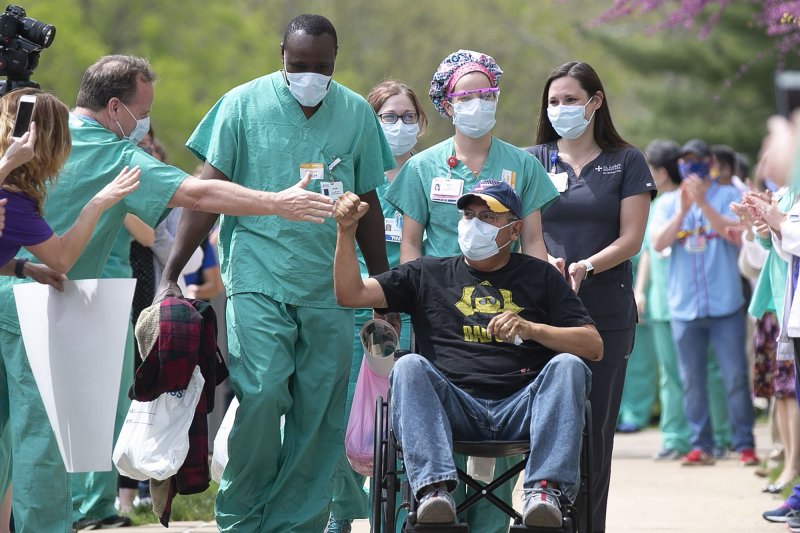St. Louis Metropolitan motorcycle Police Officer Dave Tenorio bumps fists with a health care worker, during a celebration discharge, at St. Luke's Hospital, in Chesterfield, Missouri on Friday. Photo by Bill Greenblatt/UPI |
License Photo
Worries over medical bills would prevent 1 in 7 Americans from seeking treatment if they had possible symptoms of COVID-19, a new poll finds.
Of more than 1,000 adults surveyed, 6 percent -- representing 15 million Americans -- said that during the coronavirus pandemic, they or a family member had been denied care for another health problem.
Asked if they would seek medical attention for a fever and dry cough -- telltale signs of COVID-19 -- 14 percent said they would not because of cost, according to the results from the nonprofit West Health and Gallup.
Even if they suspected they were infected, 9 percent said they wouldn't seek treatment -- a finding that suggests insurance coverage shortfalls, lack of money, or poor knowledge of COVID-19 symptoms, the survey sponsors said.
More than 20 percent of adults under age 30, nonwhites, those with a high school education or less, and those in households with annual incomes under $40,000 were most likely to not seek care for suspected COVID-19 symptoms.
"Millions of Americans, even in the face of a disease that has brought a country to its knees, would forgo care due to the potential expense and still others may not be clear on the common symptoms of COVID-19," said Tim Lash, chief strategy officer for West Health.
"While physicians and health care workers are doing courageous and lifesaving work, the pandemic magnifies the longstanding perils and flaws of a high-cost health care system in need of reform," Lash added in a West Health news release.
Regarding denial of care for other health problems during the pandemic, rates were 11 percent in the Northeast 8 percent in the West 5 percent in the South and 3 percent in the Midwest.
Those rates likely reflect how hard coronavirus has hit certain regions. New York state has had the most confirmed cases in the United States, followed by New Jersey, Massachusetts and Pennsylvania.
Race was not strongly associated with denial of care for other health problems, but income was. Nearly four times more people with household incomes below $40,000 said they'd been denied care (11 percent), compared with 3 percent of those with incomes above $100,000.
"These new findings align with previous research by West Health and Gallup on the impact of high health care costs in the U.S.," said Dan Witters, a senior researcher for Gallup.
"Last year, over 13 percent of respondents, representing more than 30 million Americans, reported having a friend or family member who died in the last five years after not being able to afford necessary care," he said in the release. "Add to that the challenges associated with COVID-19, and Americans find themselves in a quagmire as many of them turn to a system they can't afford or that can't accommodate them."
The telephone poll of a random sample of 1,017 U.S. adults was conducted between April 1 and 14.
More information
The U.S. Centers for Disease Control and Prevention has more on COVID-19.
Copyright 2020 HealthDay. All rights reserved.
![]()
















